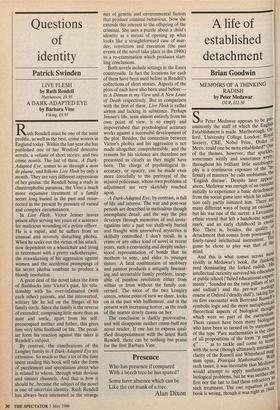Questions of identity
Patrick Swinden
LIVE FLESH by Ruth Rendell
Hutchinson, £9.95
A DARK-ADAPTED EYE by Barbara Vine
Viking, £9.95
Ruth Rendell must be one of the most prolific, as well as the best, crime writers in England today. Within the last year she has published one of her Wexford detective novels, a volume of short stories, and two crime novels. The last of these, A Dark- Adapted Eye, comes to us through a nom de plume, and follows Live Flesh by only a month. They are very different expressions of her genius: the Rendell being a study in claustrophobic paranoia, the Vine a much more expansive treatment of a family secret long buried in the past and resur- rected in the present by pressure of varied and complex circumstances.
In Live Flesh, Victor Jenner leaves prison after serving ten years of a sentence for malicious wounding of a police officer. He is a rapist, and he suffers from an unusual and severely disturbing phobia. When he seeks out the victim of his attack, now dependent on a wheelchair and living in retirement with a pretty radiotherapist, the reawakening of his aggression against women and the accidental promptings of his secret phobia combine to . produce a bloody resolution.
A great deal of the novel takes the form of flashbacks into Victor's past, his rela- tionship with his over-infatuated (with each other) parents, and the introverted, solitary life he led on the fringes of his family circle. Since the family is the reverse of extended, comprising little more than an aunt and uncle, apart from his self- preoccupied mother and father, this gives him very little foothold on life. The pecul- iar form his reaction against this takes is Rendell's subject.
By contrast, the ramifications of the Longley family in A Dark-Adapted Eye are extensive. So much so that a lot of the time spent reading this book will take the form of puzzlement and speculation about who is related to whom, through what devious and sinister channels. And that is how it should be, because the subject of the novel is one of uncertain identity. Ruth Rendell has always been interested in the strange mix of genetic and environmental factors that produce criminal behaviour. Now she extends this interest to the offspring of the criminal. She uses a puzzle about a child's identity as a means of opening up what looks like a straightforward case of mur- der, conviction and execution (the past events of the novel take place in the 1940s) to a re-examination which produces start- ling conclusions.
Both novels include settings in the Essex countryside. In fact the locations for each of them have been used before in Rendell's collections of short stories. Aspects of the plots of each have also been used before — in A Demon in my View and A New Lease of Death respectively. But in comparison with the first of these, Live Flesh is rather airless and lacking in substance. Perhaps Jenner's life, seen almost entirely from his own point of view, is so empty and impoverished that psychological accuracy works against a successful development of the plot. Besides, the connection between Victor's phobia and his aggression is not made altogether comprehensible, and the reasons for his violence are therefore not presented as clearly as they might have been. The charge of psychological in- accuracy, or opacity, can be made even more forcefully to the portrayal of the injured policeman, whose own problems of adjustment are very sketchily touched upon.
A Dark-Adapted Eye, by contrast, is full of life and interest. The war and post-war periods are described in meticulous though unemphatic detail, and the way the plot develops through memories of and inves- tigations into a past too shallowly buried and fraught with unresolved mysteries is skilfully controlled. I don't recall, in a crime or any other kind of novel in recent years, such a convincing and deeply under- stood representation of bonds that tie mothers to sons, and elder to younger sisters. A fatal combination of snobbery and passion produces a uniquely fascinat- ing and intractable family problem, incap- able of painless resolution either from within or from without the family con- cerned. The niece of the two Longley sisters, whose point of view we share, looks on in the past with bafflement, and in the present with increasing horror, as the truth of the matter slowly dawns on her.
The conclusion is darkly provocative, and will disappoint neither crime-buff nor novel reader. If one has to express qual- ified disappointment with the latest Ruth Rendell, there can be nothing but praise for the first Barbara Vine.


















































 Previous page
Previous page